Ditapis dengan
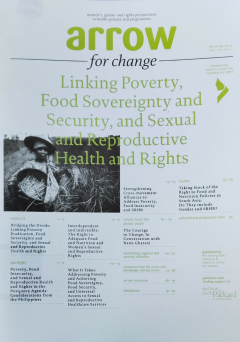
Arrow for change Linking Poverty ,Food Soverignty, and Sexual and Reproductiv…
comprehensive report that explores the intersections between poverty, food sovereignty, and sexual and reproductive health and rights (SRHR). This report highlights how these critical areas are interconnected and emphasizes the need for integrated approaches to address them effectively.
- Edisi
- 1
- ISBN/ISSN
- -
- Deskripsi Fisik
- 35 halaman
- Judul Seri
- Textbook
- No. Panggil
- 353.5 ARR a
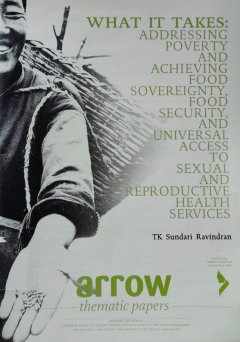
What It Takes : Addressing Poverty And Achieving Food Sovereignty, Food Secur…
Universal access to sexual and reproductive health services is one of the goals of the International Conference on Population and Development of 1994. The Millennium Development Goals were intended above all to end poverty. Universal access to health and health services are among the goals being considered for the post-2015 agenda, replacing or augmenting the MDGs. Yet we are not only far from …
- Edisi
- 1
- ISBN/ISSN
- -
- Deskripsi Fisik
- 29 halaman
- Judul Seri
- Textbook
- No. Panggil
- 353.5 ARR w
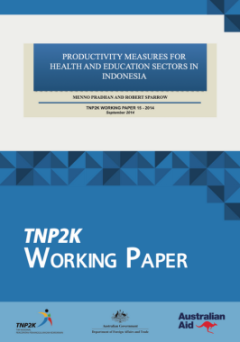
Productivity Measures for Health and Education Sectors in Indonesia
This study analyses the relative efficiency of district public health and education service delivery in Indonesia over the period 2003 to 2008. We apply production frontier models to assess the efficiency of districts in achieving education and health outputs, and costs functions to assess the efficiency of public spending. The analysis combines data from the Ministry of Finance on district spe…
- Edisi
- TNP2K Working Paper 15 - 2014
- ISBN/ISSN
- 978-602-275-109-0
- Deskripsi Fisik
- ix, 43 Halaman ; 30 cm, PDF
- Judul Seri
- Working Paper
- No. Panggil
- 362.1 PRA p
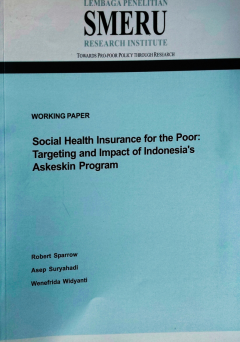
Social Health Insurance for the Poor : Targeting and Impact of Indonesia's As…
Social Health Insurance plays a crucial role in ensuring equitable access to healthcare services, particularly for the poor and vulnerable populations. Indonesia's Askeskin program serves as a case study in this research, focusing on its targeting mechanisms and the impact on healthcare accessibility and financial protection.
- Edisi
- 1
- ISBN/ISSN
- 9789793872759
- Deskripsi Fisik
- 27 halaman
- Judul Seri
- Textbook
- No. Panggil
- 368.409598 SPA s
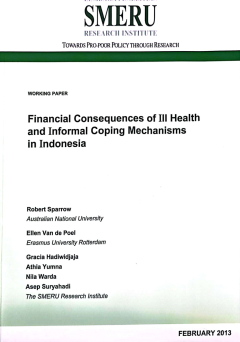
Financial Consequences of Ill Health and Informal Coping Mechanisms in Indonesia
We assess the financial risk of ill health for households in Indonesia, the role of informal coping strategies, and the effectiveness of these strategies in smoothing consumption. Based on household panel data, we find evidence of financial risk from illness through medical expenses, while income from informal wage labor is exposed to risk for the poor and income from self-employed business act…
- Edisi
- 1
- ISBN/ISSN
- 9789793872988
- Deskripsi Fisik
- i, 16 hal. ; 30 cm.
- Judul Seri
- Textbook
- No. Panggil
- 332 SPA f
 Karya Umum
Karya Umum  Filsafat
Filsafat  Agama
Agama  Ilmu-ilmu Sosial
Ilmu-ilmu Sosial  Bahasa
Bahasa  Ilmu-ilmu Murni
Ilmu-ilmu Murni  Ilmu-ilmu Terapan
Ilmu-ilmu Terapan  Kesenian, Hiburan, dan Olahraga
Kesenian, Hiburan, dan Olahraga  Kesusastraan
Kesusastraan  Geografi dan Sejarah
Geografi dan Sejarah